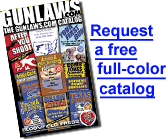
| Home | Books | National Directory | Position Papers | Alan’s Blog | FAQ | New Stuff | Search |
|
Our 1999 and 2000 updates for California will be posted shortly. Thanks for your patience while we struggle to keep up with the massive California gun laws. Coming soon Full text and legislative summaries for: SB15, SB23, AB106, AB202, AB491, AB2351
|
 on gun laws and other topics.
|

